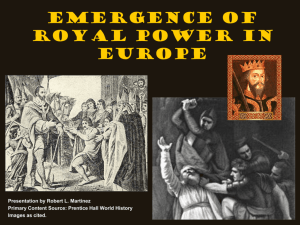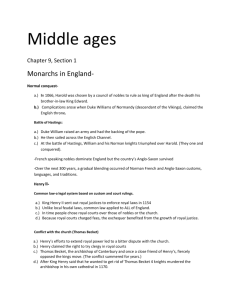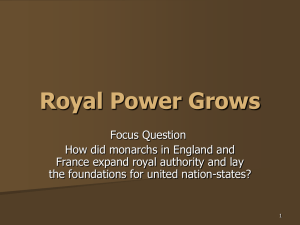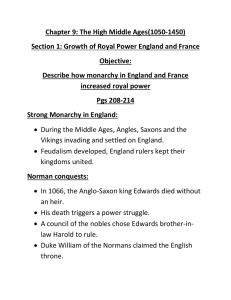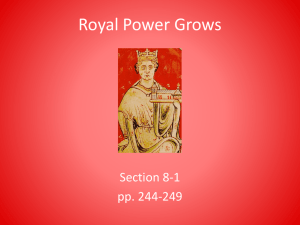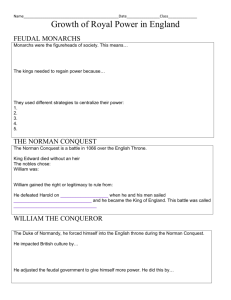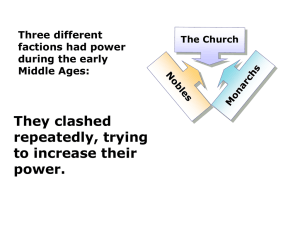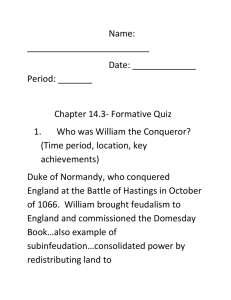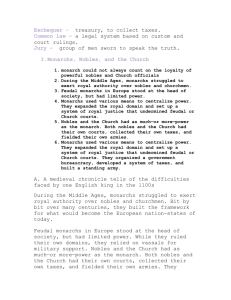reardon chapter 9
advertisement
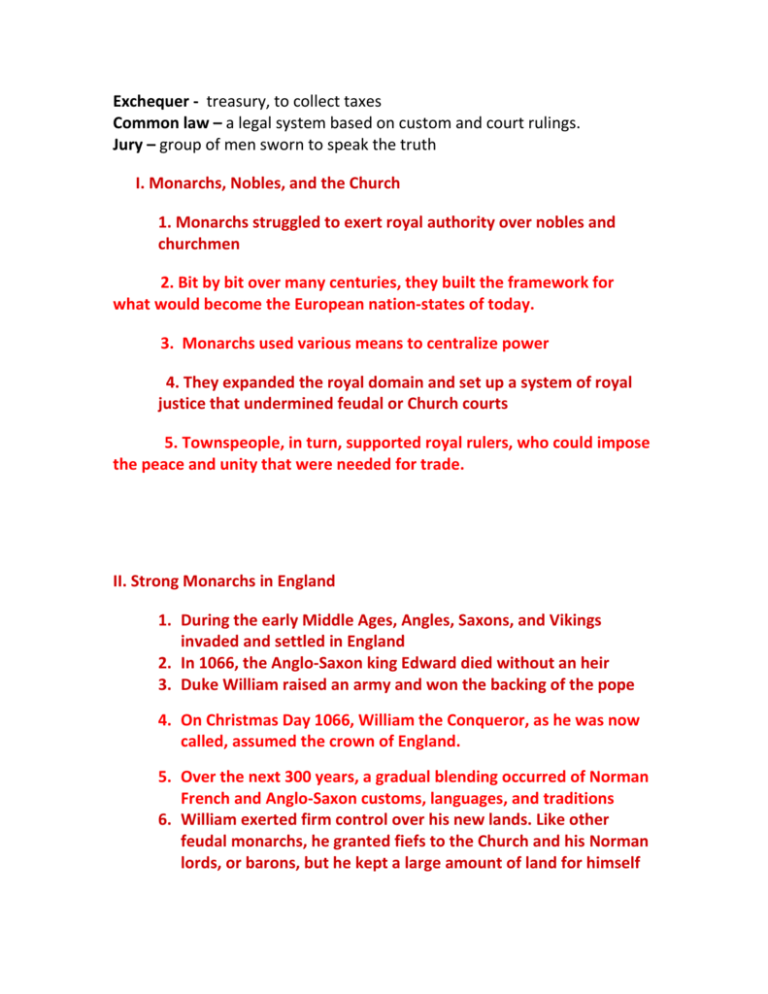
Exchequer - treasury, to collect taxes Common law – a legal system based on custom and court rulings. Jury – group of men sworn to speak the truth I. Monarchs, Nobles, and the Church 1. Monarchs struggled to exert royal authority over nobles and churchmen 2. Bit by bit over many centuries, they built the framework for what would become the European nation-states of today. 3. Monarchs used various means to centralize power 4. They expanded the royal domain and set up a system of royal justice that undermined feudal or Church courts 5. Townspeople, in turn, supported royal rulers, who could impose the peace and unity that were needed for trade. II. Strong Monarchs in England 1. During the early Middle Ages, Angles, Saxons, and Vikings invaded and settled in England 2. In 1066, the Anglo-Saxon king Edward died without an heir 3. Duke William raised an army and won the backing of the pope 4. On Christmas Day 1066, William the Conqueror, as he was now called, assumed the crown of England. 5. Over the next 300 years, a gradual blending occurred of Norman French and Anglo-Saxon customs, languages, and traditions 6. William exerted firm control over his new lands. Like other feudal monarchs, he granted fiefs to the Church and his Norman lords, or barons, but he kept a large amount of land for himself 7. He monitored who built castles and He required every vassal to swear first allegiance to him rather than to any other feudal lord. 8. He monitored who built castles and He required every vassal to swear first allegiance to him rather than to any other feudal lord. To learn about his kingdom, William had a complete census taken in 1086. The result was the Domesday Book (pronounced “doomsday”), which listed every castle, field, and pigpen in England. As the title suggests, the survey was as thorough and inevitable as doomsday, believed to be God's final day of judgment that no one could escape. Information in the Domesday Book helped William and later English monarchs build an efficient system of tax collecting. William's successors continued to increase royal authority. In the area of finance, they created the royal exchequer, or treasury, to collect taxes. Into the exchequer flowed fees, fines, and other dues A Unified Legal System In 1154, an energetic, well-educated king, Henry II, inherited the throne. He broadened the system of royal justice. As a ruler, he could not simply write new laws but had to follow accepted customs. Henry found ways to expand customs into law. He then sent out traveling justices to enforce royal laws. The decisions of the royal courts became the foundation of English common law, a legal system based on custom and court rulings. Unlike local feudal laws, common law applied to all of England. In time, people chose royal courts over those of nobles or the Church. Because royal courts charged fees, the exchequer benefited from the growth of royal justice Under Henry II, England also developed an early jury system. When traveling justices visited an area, local officials collected a jury, or group of men sworn to speak the truth. (The word jury is derived from the French juré, meaning “sworn on oath.”) These early juries determined which cases should be brought to trial and were the ancestors of today's grand jury. Later, another jury evolved that was composed of 12 neighbors of an accused. It was the ancestor of today's trial jury. Conflict With the Church Henry's efforts to extend royal power led to a bitter dispute with the Church. Henry claimed the right to try clergy in royal courts. Thomas Becket, the archbishop of Canterbury and once a close friend of Henry's, fiercely opposed the king's move. The conflict simmered for years At last, Henry's fury exploded. “What a pack of fools and cowards I have nourished,” he cried, “that not one of them will avenge me of this turbulent priest.” Four hotheaded knights took Henry at his word. In 1170, they murdered the archbishop in his own cathedral. Henry denied any part in the attack. Still, to make peace with the Church, he eased his attempts to regulate the clergy. Becket, meantime, was honored as a martyr and declared a saint. Pilgrims flocked to his tomb at Canterbury, where miracles were said to happen. Evolving Traditions of English Government Later English rulers repeatedly clashed with nobles and the Church. Most battles developed as a result of efforts by the monarch to raise taxes or to impose royal authority over traditional feudal rights. Out of those struggles evolved traditions of government that would influence the modern world. John's Troubles Henry's son John was a clever, greedy, cruel, and untrustworthy ruler. During his reign, he faced three powerful enemies: King Philip II of France, Pope Innocent III, and his own English nobles. He lost his struggles with each Ever since William the Conqueror, Norman rulers of England had held vast lands in France. In 1205, John suffered a major setback when he lost a war with Philip II and had to give up English-held lands in Anjou and Normandy. Next, John battled with Innocent III over selecting a new archbishop of Canterbury. When John rejected the pope's nominee, the pope responded by excommunicating him. He also placed England under the interdict—as you recall, a papal order that forbade Church services in an entire kingdom. Even the strongest ruler was likely to give in to that pressure. To save himself and his crown, John had to accept England as a fief of the papacy and pay a yearly fee to Rome The Magna Carta Finally, John angered his own nobles with oppressive taxes and other abuses of power. In 1215, a group of rebellious barons cornered John and forced him to sign the Magna Carta, or great charter. In this document, the king affirmed a long list of feudal rights Besides protecting their own privileges, the barons included a few clauses recognizing the legal rights of townspeople and the Church. Among the most significant of these was a clause protecting every freeman from arbitrary arrest, imprisonment, and other legal actions, except “by legal judgment of his peers or by the law of the land.” This famous clause formed the basis of the right now known as “due process of law.” The king also agreed not to raise new taxes without first consulting his Great Council of lords and clergy. Many centuries later, American colonists would claim that those words meant that any taxation without representation was unjust. In 1215, though, neither the king nor his lords could have imagined such an idea The Magna Carta contained two very important ideas that in the long run would shape government traditions in England. First, it asserted that the nobles had certain rights. Over time, the rights that had been granted to nobles were extended to all English citizens. Second, the Magna Carta made it clear that the monarch must obey the law. Development of Parliament In keeping with the Magna Carta, English rulers often called on the Great Council for advice. During the 1200s, this body evolved into Parliament. Its name comes from the French word parler, meaning “to talk.” As Parliament acquired a larger role in government, it helped unify England. In 1295, Edward I summoned Parliament to approve money for his wars in France. “What touches all,” he declared, “should be approved by all.” He had representatives of the “common people” join with the lords and clergy. The “commons” included two knights from each county and representatives of the towns Much later, this assembly became known as the Model Parliament because it set up the framework for England's legislature. In time, Parliament developed into a two-house body: the House of Lords with nobles and high clergy and the House of Commons with knights and middle-class citizens. Looking Ahead Like King Edward I, later English monarchs summoned Parliament for their own purposes. Over the centuries, though, Parliament gained the crucial “power of the purse.” That is, it won the right to approve any new taxes. With that power, Parliament could insist that the monarch meet its demands before voting for taxes. In this way, it could check, or limit, the power of the monarch Successful Monarchs in France Unlike William the Conqueror in England, monarchs in France did not rule over a unified kingdom. The successors to Charlemagne had little power over a patchwork of French territories ruled by great feudal nobles. The Capetians In 987, these feudal nobles elected Hugh Capet, the count of Paris, to fill the vacant throne. They probably chose him because he was too weak to pose a threat to them. Hugh's own lands around Paris were smaller than those of many of his vassals. Hugh and his heirs slowly increased royal power. First, they made the throne hereditary, passing it from father to son. Fortunately, the Capetians enjoyed an unbroken succession for 300 years. Next, they added to their lands by playing rival nobles against each other. They also won the support of the Church. Perhaps most important, the Capetians built an effective bureaucracy. Government officials collected taxes and imposed royal law over the king's domain. By establishing order, they added to their prestige and gained the backing of the new middle class of townspeople. Philip Augustus An outstanding French king of this period was Philip II, often called Philip Augustus. A bald, red-faced man who ate and drank too much, Philip was a shrewd and able ruler. He strengthened royal government in many ways. Instead of appointing nobles to fill government positions, he used paid middle-class officials who would owe their loyalty to him. He granted charters to many new towns, organized a standing army, and introduced a new national tax Philip also quadrupled royal land holdings. Through trickery, diplomacy, and war, he brought English-ruled lands in Normandy, Anjou, and elsewhere under his control. He then began to take over southern France. Informed by the pope that the Albigensian (al buh JEHN see uhn) heresy had sprung up in the south, he sent his knights to suppress it and add this vast area to his domain. Before his death in 1223, Philip had become the most powerful ruler in Europe. Louis IX, King and Saint Perhaps the most admired French ruler of this time was Louis IX. Louis, who ascended to the throne in 1226, embodied the ideal of the perfect medieval monarch—generous, noble, and devoted to justice and chivalry. Within 30 years of his death, he was declared a saint. A knight at Louis's court praised the king's charity: Saint Louis was a deeply religious man, and he pursued religious goals that were acceptable to Christians in his day. He persecuted heretics and Jews and led thousands of French knights in two wars against Muslims. Louis did much to improve royal government. Like Charlemagne, he sent out roving officials to check on local officials. He expanded the royal courts, outlawed private wars, and ended serfdom in his lands. To ensure justice, he even heard cases himself under a tree in the royal park of Vincennes. His enormous personal prestige helped create a strong national feeling among his subjects. By the time of his death in 1270, France was an efficient centralized monarchy Philip IV Clashes With the Pope Louis's grandson, Philip IV, ruthlessly extended royal power. To raise cash, he tried to collect new taxes from the clergy. These efforts led to a clash with Pope Boniface VIII. Declaring that “God has set popes over kings and kingdoms,” Pope Boniface VIII forbade Philip to tax the clergy without papal consent. Philip countered by threatening to arrest any clergy who did not pay up. As their quarrel escalated, Philip sent troops to seize Boniface. The pope escaped, but he was badly beaten and died soon afterward Shortly after, a Frenchman was elected pope. He moved the papal court to Avignon (ah veen YOHN) on the border of southern France, ensuring that future French rulers would control religion within their own kingdoms The Estates General During this struggle with the pope, Philip rallied French support by setting up the Estates General in 1302. This body had representatives from all three estates, or classes: clergy, nobles, and townspeople. Although later French kings consulted the Estates General, it did not develop the same role that the English Parliament did. It never gained the power of the purse or otherwise served as a balance to royal power.
